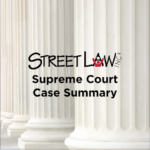Distance learning activities become civics for civic engagement when federal judges bring the rule of law, separation of powers, judicial independence, and jury service into students’ daily life. Student voice is incorporated into every activity. Teachers and students can explore the pillars of literacy: rule of law, separation of powers, and judicial independence. With the guidance of federal judges and attorney volunteers in virtual court hearings, students learn and practice civil discourse skills as the foundation of effective dispute resolution in the law and in life.
Right to Counsel
In this lesson, students will look at the various dimensions of right to counsel. They will study how the meaning of this right has evolved over time with reference to specific landmark United States Supreme Court cases. Students will develop lists of reasons why such a right is important to the functioning of the adversary process. The lesson ends with an examination of the role of the criminal attorney.
Gonzalez v. Oregon (2006)
Did the Controlled Substances Act authorize the U.S. attorney general to ban the use of controlled substances for physician-assisted suicide in Oregon? This case summary shows how the Supreme Court answered that question in 2006.
The Right to Remain Silent: Miranda v. Arizona

This documentary explores the landmark Supreme Court decision Miranda v. Arizona that said criminal suspects, at the time of their arrest but before any interrogation, must be told of their Fifth Amendment protection against self-incrimination and Sixth Amendment right to an attorney. The decision led to the familiar Miranda warning that begins “You have the right to remain silent…”
